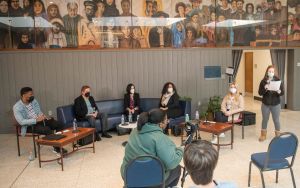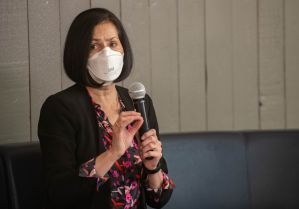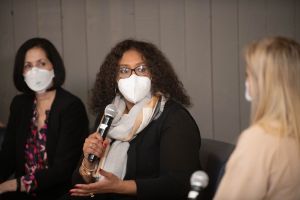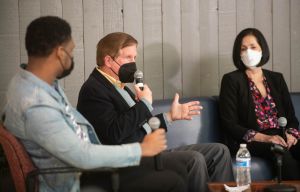This isn’t a hot button issue, rather a heartbreaking one that requires global attention.
Many global events get widespread attention by the media. However, human trafficking is not one of them. Human trafficking has permeated the underbelly of society, always beneath the surface.
“It’s in your backyard, regardless of where your backyard is,” Abbie Newman, CEO of Mission Kids Child Advocacy Center, said, while adding that regional reports of the crime are rising and many victims are being sold and exploited by family members.
Human trafficking is a worldwide, multi-billion dollar industry in which vulnerable people are manipulated by strangers or family, kidnapped, taken hostage and sold for forced labor, sex work or organ removal. The most likely to be targeted and sold into this inhuman market include women, children, members of the LGBTQ+ community, former convicts, those who struggle with low self-esteem and teenage runaways.

Three distinguished professionals visited Cabrini on Jan. 31st in Grace Hall to discuss the tragic details behind human trafficking. These professionals included Newman, Carla Clanagan, member of Cabrini’s Domestic Violence Awareness Board of Advisors and the Interagency Council of Norristown Board of Directors, and Walt Hunter, retired Eyewitness News reporter and board member of Mission Kids, the Montgomery County Child Advocacy Center.
Newman explained how human trafficking occurs not only in the King of Prussia region, but everywhere.
“I don’t care where you’re from, there is human trafficking going on,” Newman said.
She said there is a visual, infrared map from the National Human Trafficking Hotline, Polaris, that shows dots of where the national hotspots of trafficking dated back in 2019. Clusters of red dots surround major highways, with a high density of reports coming from places along I-95 and the Pennsylvania Turnpike.
“The other thing that is really important to understand is that a lot of trafficking victims, in particular adolescents and kids, are being trafficked from home,” Newman said.
Pandemic sparking more crimes
Statistics have proven that during the opioid epidemic and COVID-19 pandemic, more parents and guardians have sold their children for sexual acts.
“It has gotten worse,” Newman said. “There has been an uptick of kids on child pornography websites or people looking to purchase and abuse child pornography. If a child is locked inside with their abuser, they can’t get out. Mandated reporters, teachers, classmates and friends can’t tell if something is wrong. They’re hidden in plain sight.”
Newman shared with the audience that human trafficking is a $150 billion per-year worldwide industry. While in the U.S. alone, it’s a $44 billion per-year industry.

Newman also shared that according to a study in San Diego from seven years ago, 20 high school districts had reported at least one student whom to be believed they were a victim of human trafficking while attending school.
“Many victims of trafficking, however, initially don’t identify themselves as victims,” Newman said. “Often, there’s a grooming process. 70-90 percent of adolescents and children who are involved in human trafficking have prior histories of being child or sexual abuse victims.”
Traffickers look for groups of girls hanging out together, targeting the girls who may be left back. This is where the grooming process can begin.
“At that point, she’s not thinking that the stranger is going to snatch and sell her,” Newman said. “They’re going to manipulate her into doing things she wouldn’t normally do and afterwards, she’s not going to have a choice. She still wouldn’t consider herself a victim.”
Fortunately, Newman has also said that laws on human trafficking have improved over the past 20 years.
“I think one of the biggest issues is making sure that there’s an understanding that trafficking is everywhere,” Newman said. “Over the last few years, we’ve come up with better responses to trafficking for minors and adults. The laws pertaining to adults are different from the laws that pertain to minors. All of these laws must work together.”
Victims who don’t know they’re victims
Clanagan works closely with two programs. One community empowerment program brings in victims who do not know that they are survivors and educates them.
“We’re educating them on human trafficking through another program called ‘Ending the Game’ that talks a lot about how to come out of the life of prostitution, escorting, stripping and ultimately human trafficking or sex trafficking,” Clanagan said. “It’s all about the education, showing them and bringing them resources so that they have an understanding that there are programs out there to help them.”

Through the education program, Clanagan mentions that the victims usually have an “a ha” moment where they realized they have been a victim of human trafficking. They realize that the things that have happened to them aren’t normal and that they have been violated in some way.
The second program that she works closely with is a housing program for survivors. It is a long term residential housing program that houses only women for two years. This program is connected across the country to other shelters that do the same type of work and is part of a national alliance.
“In this program, they still come to us knowing that they’ve had trauma, some sort of violation but they still don’t recognize themselves as being sex trafficked,” Clanagan said. She explains the need of these victims to have to do something for income and that they turn to their bodies to do so.
Clanagan mentions a term called “complex trauma” to describe the type of trauma that the victims have experienced. She explains it as living the same experiences multiple times a day over a period of time.
While working with the women and educating them, Clanagan notices their behavior and how it is out of the ordinary.
“A lot of their behaviors are related to the fact that their brains have stopped functioning at the level it was supposed to function when the trauma started,” she said. “They don’t trust, they don’t know how to have healthy relationships, including friendships, they don’t have safe people in their lives, and their families have walked away from them.”
Clanagan pivots to mention that even though she deals primarily with women, men can and are victims of human trafficking, too.
“Not only are they trafficked, but they are used to get to the girls. They will use what they call a ‘romeo pimp’ to get close to the ‘it guy’ in a situation, use them to get close to the women, groom and manipulate them and get their victims that way,” she said.
Clanagan says to look out for subtle signs that are noticeable, such as changes in their behavior and the way that they dress.
Reporting in the media
With human trafficking being such a dark and mature topic, it is important that the media reports about this with the seriousness it deserves.
Hunter, after years of reporting on the dark, hidden crime in the Philadelphia area, knows how important it is for the media to cover human trafficking.
“When you cover one of these cases, you think of the faces in the windows – people that are disempowered, disenfranchised,” Hunter said. “They stick with you for the rest of your life.”
Hunter proposes a few ways on how to better report trafficking cases.

The first way, he said, is to read everything you can about a case. Cover it in court and read all documents available. “Once you have a fountain of knowledge, you must put the meat on the bones of this story and get it out there,” Hunter said.
He mentions that court case decisions often take a long time due to the trial period. He says that it is important as a journalist to keep reporting on the case after the decision was made so that voices are heard.
Keeping everyone confidential for the safety of victims is also important according to Hunter. “Lives are getting destroyed,” he said. “Naming names can cause more problems for these victims down the line.”
“This is a ‘yuck’ topic,” Hunter said. “You must come up with a sincere, compassionate and creative plan to cover this topic. You must first focus on victims to humanize them and your story. You need to get the reader’s attention, but you need to do it in the right way.”
“There is no other side to this issue, this is as close to evil personified as anything you could ever imagine.” – Walt Hunter
If you or someone you know is a victim of human trafficking, call the National Human Trafficking Hotline at 1-888-373-7888 and CAPS (Cabrini’s Counseling and Psychological Services) at 1-610-902-8561.


